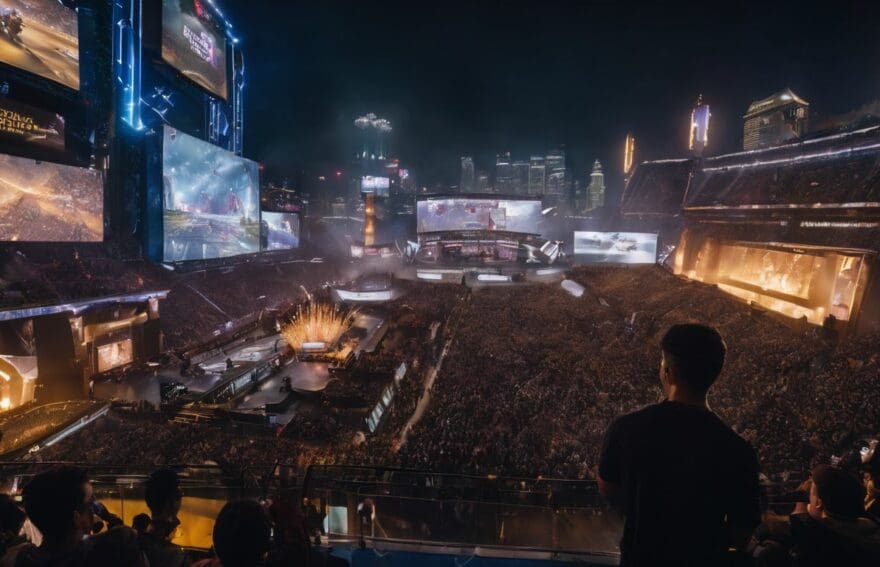Navigating the Evolution of the League of Legends Championship Series

Updated On: October 29, 2025 by James Connolly
As dedicated enthusiasts of the virtual arena, we’ve all experienced the intoxicating excitement that permeates through every stage of the League of Legends Championship Series (LCS).
It’s a sensation familiar to us—the sense of anticipation as each season unfurls, bringing with it an array of changes that can seem overwhelming at times. The LCS has not only expanded within its own realm but has also left an indelible mark on the global eSports landscape.
Our forthcoming article endeavours to demystify this kinetic tournament for you. We shall untangle its intricate history, decode its current structures and illuminate the myriad career prospects it harbours.
Prepare to embark on a journey with us; let’s navigate through the twists and turns of LCS evolution together, savouring each game-changing epoch along our way!
Establishing the League of Legends Championship Series
The LCS was established as a platform for cultivating the League of Legends community and player development, while also attracting business contributions and partnerships. It has played a pivotal role in shaping the competitive gaming landscape over the years.
Overview of the LCS
We’ve seen the League of Legends Championship Series transform into a powerhouse within the esports leagues. It’s become a beacon of professional gaming, where stability and high-level competition are paramount.
With each season, teams dive into intense online multiplayer games, battling through ever-changing game meta to claim victory.
Our journey through competitive gaming history wouldn’t be complete without acknowledging how the LCS shapes careers and pushes forward business partnerships. This league isn’t just about the players; it’s also about creating a vibrant ecosystem that includes everyone from content creators to software developers, all unified by their love for video game tournaments.
As we keep our eyes peeled on the evolving landscape of professional gamers and gaming championships, let’s appreciate how far this thrilling competition has come.
Community and Player Development
The League of Legends Championship Series (LCS) places a strong emphasis on community and player development. Through various initiatives, the LCS aims to create a supportive environment for aspiring players and teams.
This includes mentorship programmes, skills workshops, and open tournaments aimed at nurturing talent within the gaming community. Moreover, with the support of Riot Games, the LCS has been instrumental in providing resources for players to develop their careers in professional gaming.
Amidst this ecosystem, opportunities abound for both players and organisations to grow and succeed in the competitive gaming industry. Aspiring gamers can look forward to honing their craft through structured developmental programmes while also gaining valuable exposure within an expanding global eSports scene.
Business Contributions and Partnerships
Businesses have played a crucial role in the development and success of the League of Legends Championship Series (LCS). Through strategic partnerships and financial contributions, businesses have helped to sustain the growth and stability of professional gaming as well as provide lucrative opportunities for players and organisations.
These partnerships have not only boosted the profile of the LCS but also contributed to its global impact, elevating it to become one of the most competitive and rewarding eSports leagues in the world.
Partnerships with companies like Riot Games have enabled continued support for existing pro eSports leagues while also paving the way for new initiatives such as launching their own pro league, further propelling the growth, expansion, success, and innovation within the 2022-2023 Esports programme.
Evolution of the LCS
As the League of Legends Championship Series (LCS) continues to grow and evolve, we’ll explore the changing league structure, shift in player roles, and the impact of patches on meta.
These factors have significantly shaped the landscape of professional gaming and continue to influence competitive play.
Changing League Structure
The League of Legends Championship Series (LCS) has experienced several changes in its structure over the years to promote stability and competitiveness. Teams are now required to meet specific criteria for participation, ensuring that only committed organisations are involved.
Additionally, revenue sharing models have been introduced to support team sustainability, while player contracts are now standardised to offer more security and protection.
Moreover, with a franchised model, teams no longer face relegation risks and can focus on long-term development. This shift has fostered a more stable environment for players and organisations, elevating the overall quality of competition within the LCS.
Shift in player roles
Player roles in the League of Legends Championship Series (LCS) have experienced a significant evolution over the years, creating diverse opportunities for teams and individual professionals.
The meta has gradually shifted, influencing player strategies and team dynamics as they adapt to new gameplay trends. This continual adaptation is crucial for success in the ever-changing landscape of professional gaming tournaments like the World Championship.
As the competition intensifies, players are required to exhibit versatility and proficiency across various playstyles, leading to an increased demand for well-rounded skill sets within teams.
The shift in player roles at major esports events such as the League of Legends World Championship reflects the ongoing development and innovation within professional gaming. Players must now possess a deeper understanding of each role’s intricacies while adjusting their playstyle according to evolving game patches and changes in meta.
Impact of patches on meta
The impact of patches on the meta in the LCS is palpable, with each update bringing significant changes to gameplay and strategies. Teams must swiftly adapt to these alterations to maintain their competitive edge.
The evolving meta keeps the competition dynamic and demanding, requiring teams to constantly innovate and refine their tactics. This ever-changing landscape creates an exhilarating environment for players and fans alike, showcasing the evolving nature of professional gaming.
Teams in the LCS need to remain agile and flexible as they navigate through each patch’s impact on the meta. Understanding how these updates influence gameplay is crucial for staying ahead in this fast-paced arena.
Historic Moments in League of Legends World Championship
The League of Legends World Championship has seen historic moments from the early years to Korean domination and China’s rise. Explore the evolution of this prestigious gaming tournament and its impact on the esports industry!
2011-2013: The Early Years
In the early years of the League of Legends World Championship, from 2011 to 2013, the tournament was a stage for budding talent and pioneering strategies. The championship series laid the foundation for what would become a global phenomenon in eSports, with teams and players from around the world coming together to compete at an elite level.
This period marked the emergence of iconic teams and legendary rivalries that continue to influence the competitive landscape today.
During this time, Riot Games invested in creating a sustainable ecosystem for professional gamers through partnerships with organisations and sponsors. These foundational years set the stage for future developments within the league while showcasing thrilling gameplay moments that captivated audiences globally.
2014-2017: Korean Domination
During the period of 2014-2017, Korean teams dominated the League of Legends World Championship, showcasing exceptional gameplay and strategic prowess. This era marked the reign of Korean eSports powerhouse teams such as SK Telecom T1 and Samsung Galaxy.
Their unparalleled coordination, mechanical skill, and deep understanding of the game’s meta allowed them to secure multiple championship titles consecutively.
Korean domination during these years significantly impacted the competitive landscape of professional gaming. The meticulous attention to detail in their playstyle set a new standard for other regions to aspire to, encouraging players worldwide to refine their strategies and teamwork.
2018-2021: China’s Rise
2018-2021 marked a significant period in the League of Legends World Championship with China’s rise to dominance. Chinese teams demonstrated exceptional skill and strategic prowess, leading to an impressive series of victories during this time.
Their adept understanding of the evolving meta and adaptability in gameplay showcased the strength of the region’s professional gaming community on an international stage.
The shift in power dynamics within the championship reflected China’s dedicated investment in esports infrastructure, player development, and strategic partnerships. As such, it not only transformed their competitive landscape but also elevated the global standard for professional gaming leagues.
Nerd Street Discords and Career Opportunities in LCS
Exploring the opportunities for career growth in the LCS and the necessary skills and knowledge required to thrive in the industry. From analyst roles to coaching positions, there are various job roles available within the LCS that cater to different skill sets and interests.
Necessary skills and knowledge
Players aspiring to join the League of Legends Championship Series should possess exceptional teamwork and communication skills. Understanding game mechanics, strategic thinking, and adaptability to changing meta are crucial for thriving in this competitive arena.
A deep understanding of the game’s nuances, champion synergies, and itemisation is essential to make informed decisions during matches. Moreover, keeping abreast of patch notes and updates can provide a significant edge in staying ahead of evolving gameplay trends.
Knowledgeable about game mechanics
Adaptability to changing meta
Job roles in LCS
- Coaching Staff: Coaches play a pivotal role in strategising and analysing gameplay, as well as mentoring and supporting players.
- Analysts: These professionals focus on gathering and interpreting data to provide insights for improving team performance and decision-making.
- Content Creators: Responsible for creating engaging content across various platforms to promote teams, players, and events.
- Event Management: Handling logistics, planning, and execution of tournaments, ensuring smooth operations from start to finish.
- Marketing and Sponsorship: Managing partnerships, endorsements, and marketing campaigns to drive revenue and brand visibility for teams.
- Broadcast Production: Overseeing the technical and creative aspects of live broadcasts during tournaments or events.
- Player Development: Supporting player wellness, skill development, mental health support, and overall career advancement.
- Business Development: Focused on exploring new opportunities, partnerships, and revenue streams for the LCS and its affiliated teams.
Career growth opportunities
As we explore the various job roles within the LCS, it’s important to note the promising career growth opportunities that await individuals interested in pursuing a professional path in esports.
With the exponential growth and global impact of the LCS, there is a high demand for skilled professionals in areas such as coaching, analytics, event management, marketing, and content creation.
Aspiring talents with expertise in these fields have an opportunity to contribute significantly to the thriving esports industry while also advancing their careers on an international stage alongside passionate gaming enthusiasts.
In addition to specialised roles within teams and organisations, there are growing prospects for gamers looking to transition into casting or hosting esports events. The need for knowledgeable and engaging personalities presents exciting possibilities for those keen on becoming part of live broadcasts or analytical panels at prestigious tournaments like the League of Legends World Championship.
Conclusion and Key Takeaways
In conclusion, the League of Legends Championship Series has undergone a remarkable evolution, prioritising stability and rewarding top-tier play. The ever-changing meta at the World Championship demands constant adaptation from teams to succeed.
This global impact has created lucrative opportunities for players and organisations, establishing the LCS as a key player in the eSports scene. As we navigate this evolution, it’s evident that the competitive nature of eSports continues to thrive with each passing year.
FAQs
1. What does the evolution of professional gaming mean for League of Legends?
The evolution of professional gaming means that the League of Legends Championship Series constantly adapts, incorporating changes in esports meta and enhancing the competitive experience.
2. How has the League of Legends tournament evolved over time?
League of Legends tournaments have grown significantly, reflecting broader changes in esports events with more sophisticated league development and an increase in global participation.
3. Why is adaptation important in esports leagues like League of Legends?
Adaptation is key for survival and success in competitive gaming; it involves responding to meta changes and evolving strategies to stay ahead in professional gaming championships.
4. Can you tell me about the history behind these gaming competitions?
The history behind these gaming competitions showcases a journey from small-scale contests to major global events, marking significant milestones in the growth and professionalism on display at today’s top-tier esports tournaments.



